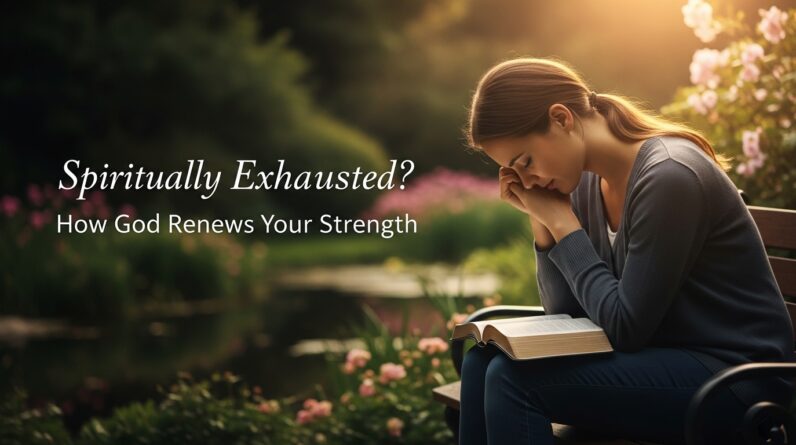The Surprising Power of Forgiveness to Heal Deep Wounds
You may have heard the old adage that forgiveness is divine. But what if forgiveness is also your key to healing deep emotional wounds? It’s easy to underestimate the profound impact that forgiveness can have on your life and well-being. Whether you’re the one who has been wronged, or you’re grappling with guilt, forgiveness acts as a powerful medicine, unlocking a space for healing and peace. Let’s delve into the surprising ways in which embracing forgiveness can serve as an essential step toward emotional and spiritual recovery.
The Psychological Benefits of Forgiveness
Forgiveness is not just a religious or moral concept; it has profound psychological benefits. Research indicates that forgiveness can significantly improve your mental health. By choosing to forgive, you let go of the emotional burdens that weigh you down. This act can lead to a reduction in stress, anxiety, and depression. When we hold onto grudges, it’s like carrying a heavy backpack filled with every hurtful experience. It drains your emotional resources and limits your capacity to live fully in the moment. When you forgive, you set down this load, allowing yourself to move freely through life.
Forgiving someone doesn’t mean you condone what they did, nor does it mean you have to reconcile with them. It’s about freeing yourself from the shackles of anger and resentment. Studies show that people who practice forgiveness tend to have lower blood pressure, reduced symptoms of depression, and a stronger immune response. The psychological benefits can be dazzling, offering a more balanced and enriched life.
Forgiveness as Healing: A Biblical Perspective
The Bible offers profound insights into forgiveness as healing. Throughout its texts, forgiveness is portrayed as a virtuous act that leads to both personal and communal well-being. The story of Joseph in the Book of Genesis provides a sterling example. Joseph was sold into slavery by his brothers, yet he later forgave them and led his family to a place of safety and abundance. Imagine the emotional freedom and relief Joseph must have felt from releasing his anger and choosing to forgive.
A well-known biblical reference is Jesus’ advice in the Book of Matthew: “For if you forgive other people when they sin against you, your heavenly Father will also forgive you” (Matthew 6:14-15). The scripture not only underscores the importance of forgiveness as a path to divine favor but also highlights its necessity for emotional liberation and healing.
In essence, Biblical forgiveness is more than a moral obligation; it’s a crucial pathway to personal healing. Through forgiveness, you unburden your soul, making way for joy, peace, and spiritual growth.
Testimonies of Healing Through Forgiveness
Hearing real-life stories of those who have embraced forgiveness can provide both inspiration and guidance. Take Maria’s story, for instance. Maria was deeply hurt by a family betrayal that left her in emotional turmoil. For years, she held onto her anger, and it seeped into every aspect of her life. One day, she read Corrie Ten Boom’s book on forgiveness, which resonated with her deeply. Inspired, Maria chose to forgive her family member. It wasn’t easy, but the act of releasing that pent-up resentment released her from its chains. She reported feeling lighter and more at peace, which culminated in the repair of broken relationships and an enriched sense of joy.
Then there’s the story of James, a father who lost his son in a tragic accident caused by a drunk driver. James struggled with rage and grief. Though hesitant at first, he decided to meet the driver, face to face, and chose forgiveness. His journey included prayer, counseling, and an understanding that forgiveness was the only way forward for emotional healing. The relief, the peace, and the sense of new beginnings he found were nothing short of miraculous.

Practical Steps to Begin Forgiving
Embarking on a forgiveness journey may seem daunting. Here are some practical steps to help you get started:
- Acceptance: Start by acknowledging your feelings of hurt. Accepting your feelings is not about wallowing in pain; it’s about understanding the depth of your emotions. Confession is powerful. Say to yourself, “I feel hurt by what happened.”
- Reflect on the situation: Consider the perspectives of everyone involved, including your own. Often, understanding the full context provides clarity that can aid in your forgiveness journey.
- Seek Spiritual Guidance: If you are religious or spiritual, prayer can provide a safe space for exploring forgiveness. You might find inspiration and strength in scripture and fellowship. For instance, the Bible suggests, “Be kind and compassionate to one another, forgiving each other, just as in Christ God forgave you” (Ephesians 4:32).
- Visualize the Freedom Forgiveness Offers: Imagine the relief of letting go of grudges. Picture yourself setting down the heavy emotional baggage. Remember, forgiveness benefits you as much, if not more, than anyone else.
- Set Boundaries: Forgiveness doesn’t mean allowing someone to hurt you again. Set healthy boundaries and listen to your intuition.
- Consider Professional Help: Sometimes, the wounds are too deep to navigate alone. Therapeutic sessions could provide valuable insights and tools for you to start this healing journey.
Challenges in the Journey of Forgiveness
Despite its benefits, the path to forgiveness is often fraught with hurdles. It’s essential to acknowledge these challenges to pave a more manageable trail forward. One major barrier is the misconception that forgiveness equates to giving the other party a free pass. It’s crucial to remember that forgiveness is about freeing yourself.
Another challenge is confronting deeply embedded anger and resentment. Allow yourself to feel these emotions without judgment. It might feel overwhelming at first, but recognizing these feelings is crucial for moving toward forgiveness.
Additionally, the expectation of receiving an apology or acknowledgment from the one who hurt you can be a significant obstacle. Not everyone will own up to their mistakes, and placing your healing in their hands only delays your journey. Choose forgiveness for your well-being, irrespective of others’ actions.
Recognize that forgiveness might need to happen more than once. You may need to repeat this act, especially if certain triggers reignite old wounds. Patience is vital; healing as a journey isn’t a one-time event but a continual process.
Why Choose Forgiveness?
Opting for forgiveness can feel like a mammoth task, yet choosing it can transform your life in unimaginable ways. In essence, forgiveness as healing does not just heal the heart; it opens up space for personal growth and spiritual blessings. Why hold onto the burden of resentment when you can relish in the freedom forgiveness brings? The leftover emotional energy can be redirected toward things that bring joy, fulfillment, and peace to your life.
The ability to forgive can significantly enhance your quality of life. A healed heart breathes life into broken relationships, renews faith, and brings a new vibrancy to daily living. You will find yourself more resilient, able to approach life’s challenges with grace and composure. Transformation awaits you when you allow forgiveness into your life.
Embracing Forgiveness: A Continuous Commitment
Once you decide to forgive, remember that it’s a continuous journey, not a one-time decision. Life will present endless opportunities for forgiveness; every interaction can carry its own set of challenges and grievances. It’s about continuing to make forgiveness part of your identity, refining how you perceive wrongdoings, and embracing the emotional freedom it provides.
To embed forgiveness in your daily life, practice gratitude and mindfulness. Gratitude refocuses your attention on what’s good and uplifting in your experience, reducing fixation on what’s gone wrong. Mindfulness fosters moment-to-moment awareness, allowing you to process emotions as they arise without letting them fester into grudges.
Forgiveness and Health: An Overlooked Connection
The health benefits of forgiveness are often overlooked, yet they are integral to the process of healing. Chronic anger has been linked to cardiovascular problems, a compromised immune system, and increased anxiety and depression. Engaging in forgiveness can negate these health risks, offering something akin to a fresh start on life.
By fostering forgiveness, you infuse your life with positive emotions that enhance not just your mental health but your physical well-being. It’s like watering a plant — when your emotional roots are nourished with forgiveness, the blossoms of good health naturally follow.
Forgiveness and the Search for Peace
Ultimately, what you seek in forgiveness is peace — a state of equanimity that shields your heart from the chaos of unresolved emotions. Whether you find this peace through meditation, prayer, counseling, or simple acts of kindness, understanding that forgiveness is the gateway to such peace is the first step. When forgiveness is practiced sincerely, the peace it brings extends beyond personal boundaries, shaping a kinder, more compassionate world.
Weaving forgiveness into your life isn’t just about the here and now; it’s about crafting a legacy of love and resilience for future interactions and relationships.
Conclusion: The Divine Freedom of Forgiveness
The discovery of forgiveness as healing may surprise you with its depth and impact. By exploring both biblical truths and psychological findings, we’ve unearthed the multifaceted benefits of forgiveness, showcasing it as a dynamic force for emotional and spiritual healing. As you ponder forgiveness, remember it’s about reclaiming your empowerment, peace, and joy. It’s an invitation to detach from past grievances and step into a future filled with light and love.
Explore More
For further reading and encouragement, check out these posts:
👉 7 Bible Verses About Faith in Hard Times
👉 Job’s Faith: What We Can Learn From His Trials
👉 How To Trust God When Everything Falls Apart
👉 Why God Allows Suffering – A Biblical Perspective
👉 Faith Over Fear: How To Stand Strong In Uncertain Seasons
👉 How To Encourage Someone Struggling With Their Faith
👉 5 Prayers for Strength When You’re Feeling Weak

📘 Jesus and the Woman Caught in Adultery – Grace and Mercy Over Judgement
A powerful retelling of John 8:1-11. This book brings to life the depth of forgiveness, mercy, and God’s unwavering love.
👉 Check it now on Amazon
As a ClickBank Affiliate, I earn from qualifying purchases.
Acknowledgment: All Bible verses referenced in this article were accessed via Bible Gateway (or Bible Hub).
“Want to explore more? Check out our latest post on Why Jesus? and discover the life-changing truth of the Gospel!”








